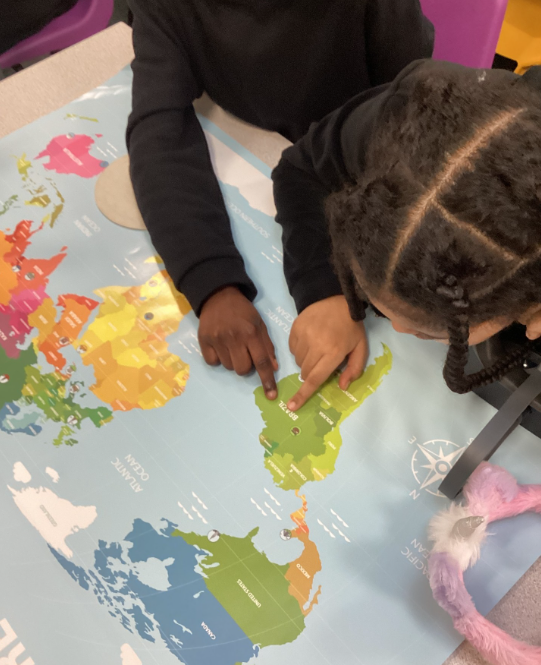Geography
Intent
At New Bewerley Community School, we strive to celebrate the richness of our community and its diverse cultures by encouraging pupils to view the world from fresh perspectives. Central to our curriculum is the city of Leeds, which runs like a thread throughout our teaching. We aim to help pupils develop a clear understanding of their place in the world—globally, nationally, and locally.
Our curriculum honours the cultural diversity within our community and the wider world, sparking curiosity about the world and its people. We encourage pupils to ask insightful questions and foster a genuine enthusiasm to explore and answer them. We want children to feel empowered to express their views on global issues, ensuring they are informed, respectful, and environmentally conscious.
Through enriching experiences and the development of geographical skills, we focus on building cultural capital. Fieldwork in our local area and beyond plays a key role in this, allowing children to connect with the world around them. By sharing experiences and learning from one another, we deepen pupils’ understanding of the broader world.
Our goal is to equip pupils with knowledge about diverse places, people, resources, and environments, while developing a deeper understanding of both physical and human geography. We aim to inspire children to think critically about their place in the world, explore their values, and understand their rights and responsibilities towards others and the environment.
Please click the icon below to see how we structure our Geography Curriculum.

To further enrich our curriculum, we incorporate trips, guest speakers, real-life experiences, and outdoor learning opportunities whenever possible. Community involvement is a cornerstone of our approach, and we make every effort to invite families and visitors to engage in our learning journey.
Please click this link to see our Educational Visits Long Term Plan
Implementation
Geography in EYFS
In the Early Years Foundation Stage (EYFS), geography is integrated into the "Understanding the World" area of the curriculum, as outlined in Development Matters. It is taught through engaging, hands-on activities in thoughtfully designed learning spaces, encouraging active learning and critical thinking.
Children in EYFS:
- Explore the natural world both indoors and outdoors, through activities, trips, and direct experiences.
- Begin to understand the importance of caring for their environment and all living things.
- Learn about different countries, discussing and appreciating their unique characteristics.
- Begin to interpret basic maps to gather information.
- Identify similarities and differences between life in their own country and in others.
- Recognise that different environments exist and that some are very different from their own.
- Observe and understand the changes that occur with the changing seasons.
These experiences lay the groundwork for children to access and engage with the National Curriculum in Year 1.
The Purpose of Geography in the National Curriculum
A high-quality geography education aims to inspire pupils with a curiosity and fascination about the world and its people that lasts throughout their lives. Teaching should provide students with knowledge of diverse places, people, resources, and both natural and human-made environments, alongside a deeper understanding of key physical and human processes. As students progress, their growing geographical knowledge will help them understand the interactions between physical and human processes and how landscapes and environments are shaped and change over time.
We aim for each child to understand what it takes to become a Geographer through the use of specific Key Skills and Knowledge. These are listed below:
Geographical Skills We Teach:
- Location Knowledge
- Place Knowledge
- Human Geography
- Physical Geography
- Geographical Skills and Fieldwork
At New Bewerley Community School, we use knowledge organisers in History to help pupils build a clear and structured understanding of key historical concepts and content.
By using knowledge organisers, pupils are able to make connections between different historical events, understand key concepts in greater depth, and develop the skills to recall and apply their knowledge more effectively.
Examples of Knowledge Organisers
Impact
Our Geography curriculum is designed to inspire pupils to become passionate and engaged learners, as demonstrated through various forms of evidence, including pupil feedback and their work. By the time they leave New Bewerley Community School at the end of Key Stage 2, our children will have a deeper knowledge and understanding of Geography and the world around them. They will retain and apply what they’ve learned, and will be motivated to continue their geographical studies as they transition to secondary school. Throughout their learning journey, pupils will also develop valuable life skills that they can use and build upon beyond their time at school.
Geography assessment is a continuous process throughout each topic, helping teachers to plan lessons and tailor activities to meet students' needs. Prior learning is revisited at the beginning of each lesson through memory recall questions and the use of knowledge organisers. Summative assessments are carried out at the end of each topic and teachers assess the children to ensure they gave a secure understanding of each topic's MUST KNOW Knowledge.
Please see examples of MUST KNOW Knowledge below:
Y1 MUST KNOW Knowledge - Weather in the UK
Y5 MUST KNOW Knowledge - Extreme Earth
Throughout the year, the leadership team conducts book looks and gathers pupil feedback to monitor and evaluate the quality of teaching and learning across the school.

